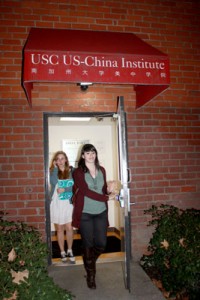USC aims to recruit more native Chinese students
As USC continues its path toward becoming a more global university, the undergraduate admissions office has implemented new tactics to recruit students from Chinese public high schools.
Instead of solely visiting the international high schools that typically send their students abroad for college, USC is now focused on spending more time in mainland China visiting students in public high schools, according to Kirk Brennan, director of Undergraduate Admissions.
Brennan said the admissions office noticed an increase in applications from students in mainland Chinese public schools and decided it was important to continue to get the word out about USC.
“We go where the great students are,” Brennan said.
Over the past five years, USC has experienced a 250 percent increase in enrolled freshmen from China from 2005 to 2010.
This increase in the Chinese student population not only reflects the new recruitment tactic but also mirrors the development of China as a growing global force, according to Clayton Dube, associate director of USC’s US-China Institute.
“China now needs to transition from being a country of cheap labor to being a country of innovators,” Dube said. “There’s an economic ability to send students abroad, and there’s an economic necessity to send students abroad.”
Although it’s not possible to predict whether this increase in the Chinese population at USC will continue in the coming years, the Office of Undergraduate Admissions does not have any plan to limit the number of applicants it admits from China.
“Capping isn’t really in our thinking in any kind of arrangement; it’s impossible to imagine how disproportionally the market would have to grow to even consider any governing measure to control the population,” Brennan said.
Brennan added that he thinks, the increased Chinese population is beneficial to both Chinese students and students of other cultures.
“Our students have a better experience, we feel, by hearing from students with different perspectives,” Brennan said. “The more diverse the perspective from the classroom, the better the education.”
Some international students say a larger Chinese population helps them ease into the new culture, as well as feel closer to home.
“If you have Chinese friends, it’s easier to get updated about what’s going on at home. You have someone you can talk to about things like Chinese New Year,” said Sherry Wang, a sophomore from Beijing majoring in business administration.
USC is continuing to work to unite the two cultures, according to Dominic Cheung, chair of the USC East Asian Studies Center.
“We have already established a lot of impact in China with the US-China Institute … We are doing a lot to promote the interest of Chinese studies, both in large general education courses and also in upper division and graduate seminars,” Cheung said.
A large international population is also beneficial to USC for dealing with international relations.
“On a global scale the U.S. government is interested in having international students because we can directly show the world what the American way of doing things is all about,” Brennan said. “It’s a great way to spread good will.”
The choices Chinese international students have been making upon graduating from USC have been changing over the past couple of years, according to Dube.
Until recently, Dube said, many students have stayed in the United States or gone to Singapore or Hong Kong, instead of returning China.
“The reason for this is mostly personal, they value economic opportunity and the choices they have in the U.S. and elsewhere,” Dube said.
But according to Dube, China has recently been offering more job opportunities for individuals.
Jing Pu, a first year masters student studying electrical engineering, plans to find a job in the United States after graduating from USC, but intends to go back to China after a couple of years because she still feels more acquainted with Chinese culture.
“Many more people today feel like their economic future will be in China, but they will feel like it’s necessary to get some work experience outside China first,” Dube said.

